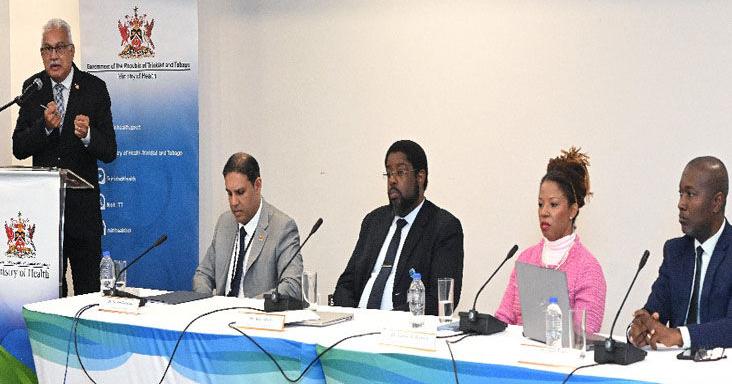Thirty-one homeowners were fined and ordered to clean up mosquito breeding sites around their homes within seven days.
A further 10 notices have been issued to homeowners in the St Andrew/St David area, 15 in Victoria, two in St Patrick and four in Naliva/Mayaro.
This was revealed by Minister of Health Terrence Deyalsingh at a press conference held at the Ministry of Health headquarters in Queen’s Park East, Port of Spain to provide an update on dengue fever in Trinidad and Tobago.
The meeting was attended by Chief Medical Officer Dr Roshan Parasram, Epidemiology Technical Director Dr Avery Hines, Caroni County Medical Officer of Health Dr Janine St. Bernard and Specialist Medical Health Officer for the Insect Vector Control Division (IVCD) Dr Osafo Fraser.
Deyalsingh was trying to address comments made by Opposition lawmaker Khadija Ameen on Wednesday that the government’s struggle to tackle the dengue problem was due to a lack of proper drainage and infrastructure.
“Mosquitoes don’t live in mossy, green, dirty drains. They can’t continue their life cycle without human bites, so source reduction is primarily a domestic issue,” he said.
He reiterated, “The fight against dengue is mainly focused on containers that hold clear, stagnant water, such as tyres, rain gutters, flower pots, saucers and vases inside the house, including any flower pot kept on the front porch.”
And therefore, he said, the public should emphasise on their responsibility to keep their surroundings unsuitable for mosquito breeding.
A single bottle cap can contain up to 1,000 mosquito eggs, and a single tire can contain around one million eggs, Deyalsingh said.
He also warned people against buying chemicals to spray around the area to get rid of mosquitoes.
“These irresponsible people and some companies are encouraging others to endanger the lives of citizens by buying malathion and withholding protective gear for political gain,” he said.
He said that under the Ministry of Health’s IVCD, such chemicals are used in very small quantities.
“These substances have to be precisely titrated and calculated to ensure human health is not compromised, but certain businesses in southern Trinidad, under the direction of the Politburo, are seeing this as a political opportunity,” Deyalsingh said.
Responding to calls from various companies for more spraying over the past week, Deyalsingh said: “As we have been saying for years, overspraying has two consequences. In two years, the same family will be spraying and you know what will happen? The mosquitoes will stand there and mock you because they have developed a resistance. It will destroy the ecosystem around your home, killing dragonflies, ladybugs, spiders, fish and birds and will cause an unknown ecological disaster.”
As for how IVCD resources are allocated, Fraser said, “When a suspected or confirmed case is reported, we respond. That response is done on a county-by-county basis. Each county has an IVCD office, and that office is staffed and (equipment) to respond to those cases.”
Hinds also reported that to date, Trinidad and Tobago has recorded 229 cases of dengue and two dengue-related deaths.
He noted that the data was provided by both public and some private healthcare institutions, and called on private practitioners, who do not routinely share data, to share it, especially on dengue.
He said if such information is reported to the county health office, appropriate measures such as spraying can be taken to prevent the spread of dengue.
He said existing data shows Victoria, St Patrick and Caroni counties have the highest number of cases, followed by St George East and West counties.


